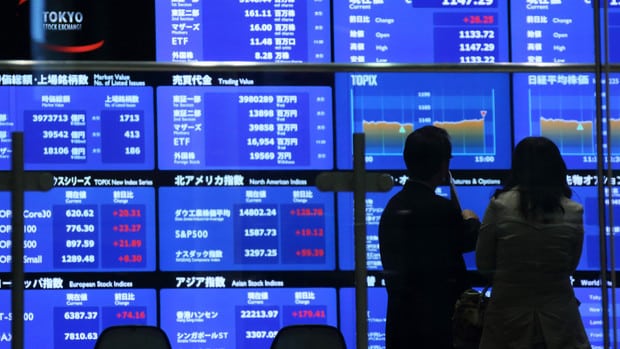Asian stocks kicked off the week on a negative note, following a selloff in U.S. stocks after a better-than-expected jobs report fueled speculation the Federal Reserve will hike interest rates soon, while a report showed Japanese economic growth was weaker than previously reported.
The MSCI Asia Pacific Index, a broad barometer for the region’s markets, was down 1 percent at 12:46 p.m. in Tokyo, extending declines from last week as Japan’s Topix index traded below a seven-year high.
A larger-than-estimated rise in U.S. payrolls and increasing Chinese exports to America made it clear how the world’s biggest economy is outperforming on the world stage as the Federal Reserve considers the timing and pace of rate increases. The chances of a U.S. interest rate hike by September increased to 60 percent, higher from 49 percent on Thursday as unemployment rate came to a 6-1/2 year low in February. Data Monday provided signs Japan’s exit from recession was slower than projected.
“The market’s response to the much-awaited U.S. payrolls report was abrupt,” Kymberly Martin, a markets strategist in Wellington at Bank of New Zealand Ltd., said in a note to clients. “This will provide sufficient ammunition for the Fed to remove patience from their statement at the next meeting and undertake an initial rate hike in June.”
The Topix Index reported a fall of 0.4 percent in Tokyo, moving away from its best closing level not seen since December 2007. It marked a 1.1 percent gain for the week. Japanese GDP grew an annualized 1.5 percent in the October-December quarter versus a preliminary reading last month for 2.2 percent growth.
“The massive drop in U.S. stocks is weighing more than the negative GDP revision,” said Tetsuo Seshimo, a portfolio manager at Saison Asset Management Co. in Tokyo, which oversees about $857 million. While taking into account the gross domestic product revision, “as long as exports are gaining, we should see a spiral where that leads to higher business spending.”
Hong Kong’s Hang Seng index was trading down 0.7 percent, and a gauge of Chinese firms listed in the city fell 1.1 percent. In China, the benchmark Shanghai Composite Index lost 0.9 percent amid worries over tighter liquidity. The Australian stock market’s benchmark S&P/ASX 200 Index dropped 1.3 percent as utilities and materials producers posted big losses after the price of iron ore continued its fall to a record low.
The Kospi index in Seoul was 0.7 percent lower, while New Zealand’s NZX 50 Index showed almost no change.










